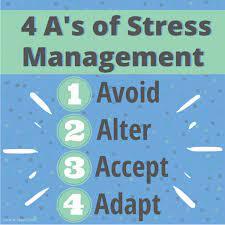What do you think is the number one cause of stress at work? Is it deadlines, difficult coworkers, or constant interruptions? Wrong on all counts. The leading cause of workplace stress is feeling like you don’t have enough control over your job. This makes sense when you consider how much time we spend at work and how our jobs provide a great deal of meaning in many people’s lives. In this article, we will explore some ways to handle everyday stress at work so that you can enjoy your career more!
Contents
- 1 What is Stress At Work?
- 1.1 Reasons for stress at work
- 1.2 When is Workplace Stress Too Much To Handle?
- 1.3 Warning Signs Of Stress At Work
- 1.4 What Triggers Stress at Work?
- 1.5 Risk Factors Of Stress at Work
- 1.6 How to Reduce Stress at Work?
- 1.7 How can you help yourself?
- 1.8 What are the benefits of managing stress?
- 1.9 How can an employer help you with stress at work?
- 1.10 Helping a colleague with stress
- 2 Conclusion
What is Stress At Work?

Stress is a normal response to pressure. When your body is stressed, you get a faster heart rate and more blood. You can do something right away if needed. When there is a threat or challenge in front of you, it is great. But when the “threat” comes from coworkers who are difficult and have a never-ending to-do list, it’s not so helpful. In the past, people needed to survive physical danger. In today’s world, it is hard to not have chronic stress. The body’s stress response can be a big part of this problem.
Reasons for stress at work

- Lack of control over work tasks: This is the number one cause of stress for people. They feel like they are not able to do their job in the way that they want to and this makes them very unhappy
- Work overload: This can be caused by too many tasks, tight deadlines, or unrealistic expectations from managers
- Interruptions: Constant interruptions at work can lead to feelings- of stress
- Conflict: This is a very common cause of workplace conflict. We all have different ways of seeing the world and working with others, which can lead to people feeling stressed out by each other
- Lack of support from managers or supervisors: Your manager plays a big role in how you feel at work. If they show that they care about you and support your work, it can make a world of difference
- Unclear job expectations: If you don’t know what is expected of you, it can be very stressful.
- Too much or too little work: Both of these situations can be a cause for stress at work.
- Poor working conditions: If you are in a place that is noisy, dirty, or hot it can be very stressful
- Incompetent co-workers or bosses: This can be very frustrating and lead to a lot of stress
- Bullying or harassment: This is a type of conflict that can be extremely stressful
When is Workplace Stress Too Much To Handle?
It is normal to feel some stress at work. This can even help you do your job better and make it more enjoyable. You might feel stressed out after a conflict or when tight deadlines are coming up. However, if the workplace stress becomes overwhelming then this could be a sign that something needs to change for things to get better. There are a few signs that can mean you are experiencing too much stress at work.
- You feel overwhelmed and constantly stressed out
- Your health has been affected, either physically or emotionally
- You have trouble sleeping or eating properly
- You’re feeling irritable or angry all the time
- You’re not able to concentrate on your work
Warning Signs Of Stress At Work

Physical Symptoms
- Headaches or stomach aches – These are common stress symptoms. You might even feel pain in your back, neck, jaw muscles, shoulders, fists, and feet
- Fatigue – If you are constantly stressed out at work you will probably have trouble sleeping at night
- Shaking hands – This can be a sign of extreme stress
- Sweating – This is your body’s way of trying to cool down when it’s stressed
- Chest pain – This can be a sign of a heart attack, so if you experience any chest pain, please seek medical help right away
Emotional Symptoms
- Anxiety or feeling overwhelmed – You might feel like you are constantly on edge and this can be very tiring
- Depression or feeling sad – You might not feel like doing anything and this can lead to problems at work and home
- Isolation from friends and family – When we are stressed, we often pull away from the people who care about us the most
- Irritability or short temper – This can cause problems with co-workers and loved ones
- Lack of focus or productivity
What Triggers Stress at Work?
Many things can trigger stress at work. It might be something as simple as a co-worker who is always complaining, or a difficult task that you don’t know how to do. Sometimes the stress triggers are outside of work, such as problems with your family or finances.
The important thing is to learn what triggers stress for you and try to avoid those things as much as possible or deal with them more effectively.
Risk Factors Of Stress at Work
Some risk factors can make you more likely to experience stress at work.
- Working long hours – This can leave you with little time for yourself and lead to fatigue
- Having a low income or no job security – This can be very stressful, especially if you have bills to pay or children to support
- Not having control over your work – If you have no say in what is expected of you or how to do it, this can cause a lot of stress
- Lack of social support at work – Having friends and others around who care about you will make the workplace more enjoyable
How to Reduce Stress at Work?

There are many things you can do to reduce stress at work.
- Take a break: Even if you just take a minute to walk around and get some fresh air, this can help
- Eat healthily: Eating protein or good carbs before your shift starts will give you energy throughout the day
- Take care of yourself: Sleep well, exercise regularly, and make time for fun things in your life. This will leave you feeling more energized and relaxed
- Talk to someone: If you are feeling overwhelmed, talk to your supervisor, a friend, or a therapist. This can help you feel more in control and less stressed out
How can you help yourself?
Even though stress is a natural reaction to certain events, it doesn’t have to control your life. If you are feeling overwhelmed at work there are many things you can do to take back control and manage the stress in your life more effectively.
Turn to co-workers for support
If you have a good relationship with your co-workers, they can be a great resource for support. Talk to them about your stress and see if they have any ideas for how to deal with it.
Take a break when you need it
When your stress level is getting high, take some time to step away from the situation. Go for a quick walk or just sit in the quiet of the restroom until you feel yourself calming down.
Do something positive every day
This can be as simple as making sure to smile at someone each day or stopping to appreciate a helpful co-worker.
Take time for yourself every day
Do something that you enjoy, whether it’s going for a walk, reading your favorite book, or spending time with friends and family. This will help you feel more relaxed and less overwhelmed.
Build new satisfying friendships at work
If your coworkers are not supportive, you can still build satisfying friendships with people who have similar interests. Look for groups or clubs at work where you can meet new friends and enjoy some of the same things that you love to do outside of work.
Keep a check on your diet

If you feel yourself getting stressed, make sure to eat a healthy meal. This will give your body the energy and nutrients it needs to manage stress effectively. You can follow the below-mentioned things:
- When you are stressed, you might crave sugary foods or comfort foods. These are bad for your mood and they only make the stress worse.
- Reduce your intake of foods that can make you feel bad, like coffee, food with lots of chemicals or hormones.
- There are some things you can eat for your mood. One is Omega-3 fatty acids. You can get them from fish, seaweed, flaxseed, and walnuts.
- Do not smoke when you are feeling stressed. Smoking can seem calming, but nicotine is a stimulant and leads to higher levels of anxiety.
- Drink alcohol in moderation. When you drink too much, it will make you feel bad when it wears off.
What are the benefits of managing stress?

Managing your stress can give you many benefits.
- It will help you feel more in control, which reduces feelings of anxiety and depression.
- You’ll be able to focus better on the task at hand without worrying about what could go wrong.
- When you manage stress effectively, you might sleep better. This is because it allows the tension in your body to release.
- When you manage stress, you will have a better relationship with the people in your life. You won’t be angry or short-tempered.
- Stress can make your feel bad. It can make you think that what happens in the workplace is because of you. But if you manage it, then maybe it won’t be so hard for you to do a good job at work and not worry about bad things happening.
How can an employer help you with stress at work?

If you are an employer, then there are many ways that you can help your employees manage stress.
Consult your employees
Ask them how they are feeling and if they are experiencing any stress. You can plan activities that help to reduce their stress. Assign tasks that are not too stressful: If you assign the right tasks without putting too much pressure, then it will be easier on them.
Provide an outlet for anger and aggression
Employees may feel like they need to take out all of their frustration with bad days at work by yelling or being aggressive toward others, but this does nothing good for anyone involved. It is important to provide a safe place where employees know they won’t get in trouble if they let go of some steam.
Support your employees when needed
Listen closely to what each employee says so you can better support them during difficulties. This can be as simple as talking it out with them or giving advice.
Encourage breaks
If you see an employee who looks like they are struggling, encourage them to take a break. This can be a five-minute walk or just some time away from their desk to gather their thoughts.
Offer flexible work hours
Some people find that working nontraditional hours helps reduce stress. If this is something your employees would like, consider allowing it.
Promote healthy habits
Make sure that your workplace has wellness programs in place that encourage healthy eating and exercise habits. This will help employees feel better both physically and emotionally.
There are many ways for employers to help manage stress among their workforce; however, the most important thing is open communication. Employees should feel comfortable talking openly about how they are feeling to find the best stress-relieving solutions for everyone.
Helping a colleague with stress

If you are a colleague, then there are ways that you can help out your co-worker who is stressed.
- Offer support: Be supportive of their feelings and offer words of encouragement to remind them they aren’t alone in this struggle.
- Listen carefully: If the employee wants to talk about what’s going on at work, listen closely so you don’t miss any important details or clues as to how best to help. You can ask questions if something seems unclear or confusing so that both of you understand it better together.
- Keep distractions low: Try not to bring up anything unrelated when talking with an anxious coworker because even small things may seem like big deals and add tension to the situation. The same goes for distractions like phones and computers; try to keep them off or put them away while you are helping your coworker.
- Encourage breaks: Employees need to take a break when they need it, especially if they are feeling overwhelmed. If you see that your colleague is starting to get stressed, encourage them to take a quick walk or just relax for a few minutes.
- Create a calm environment: Sometimes all it takes is for the environment to be more calming for someone who is struggling with stress to help them focus better. Try turning off any loud machines, keeping the conversation light and positive, and avoiding confrontations.
Managing stress at work can seem daunting, but by following these tips, everyone can learn how to better help each other with this common workplace ailment.
Conclusion
When you feel stressed, it’s important to take a break and let your mind rest. If work is what’s stressing you out, try taking a few minutes of downtime before returning to the task at hand. It may even help if someone else takes over for you so that you can get some fresh air or find something relaxing to do! The most successful people know how important it is to maintain their mental health by spending time away from doing tasks they don’t enjoy. To be productive in both personal and professional life, we need our minds rested and refreshed.
For more information, please contact MantraCare. Stress can have both physical and mental effects on the body, leading to negative consequences such as anxiety, depression, and even physical illnesses. If you have any queries regarding Online Stress Counseling experienced therapists at MantraCare can help: Book a trial Stress therapy session


